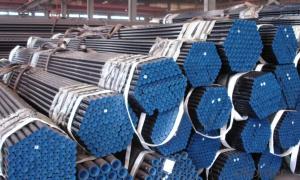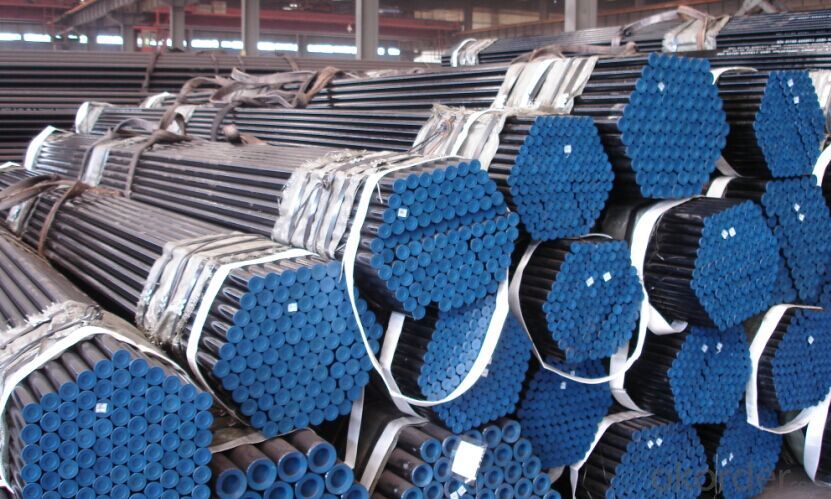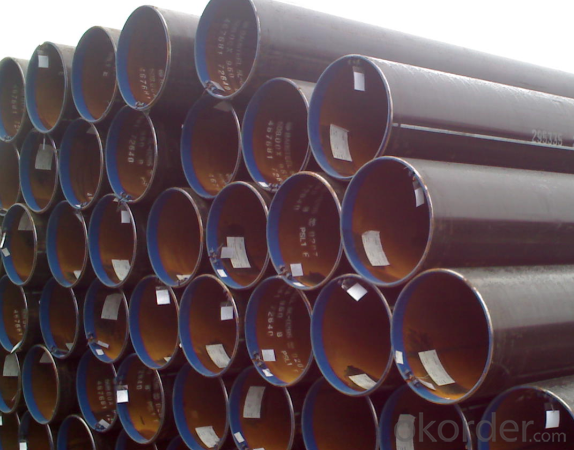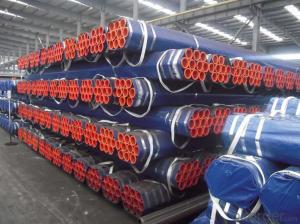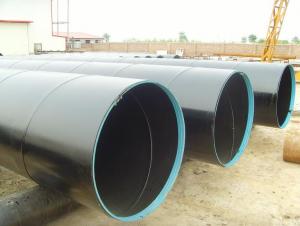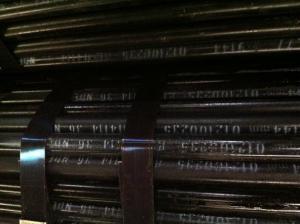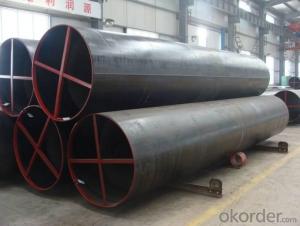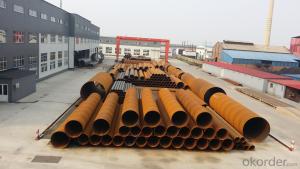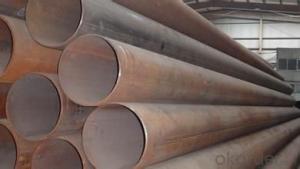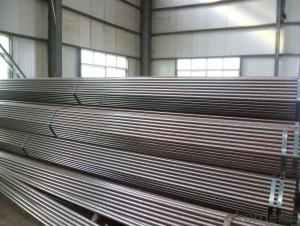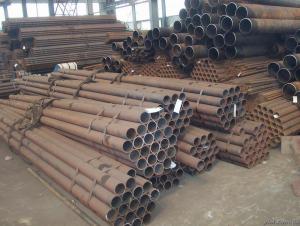Round Seamless Steel Pipes
- Loading Port:
- Tianjin
- Payment Terms:
- TT or LC
- Min Order Qty:
- 100 m.t.
- Supply Capability:
- 1000 m.t./month
OKorder Service Pledge
OKorder Financial Service
You Might Also Like
Product Details:
1. Commodity Name: Seamless steel pipe
2. Standard: API,GB,ASTM,ASME,DIN
3. Quality grade: 10#, 20#, A106B, A53B, API 5L B, Q235, Q345, ST37-2, ST 45, ST52.etc.
4. Dimension:
OD: 1/2"-24"
WT: 2.5-80mm, SCH10~SCH40~XXL
length: 5.8m,6m,8m,9m,12m
5. Technique: Hot Rolled/Cold Rolled/ Cold Drawn
6. Application
Widely used in gas, water and oil, transpotation;constructions;Bridge,highway,windows of model steel door; building materials;fences;heating facilities Fluid Pipe;conduit pipe,scaffolding pipe.etc.
7. Payment Terms: L/C D/A D/P T/T
8.packing and shipment
Packaged in bundles,as per customers' requirements, it can also bepackagesd as beveled ends, typed marking, black painting, plastic caps protection,woven bags packing
For 20" container the max length is 5.8m; For 40" container the max length is 12m. other options are available based on customer requests. Please discuss when placing orders.
9. Surface: painted with varnish;
10. Plastic caps at ends.
11. Tolerance: OD +1%/-1%
WT +12.5%/-10%
Seamless Black Steel Pipes Image
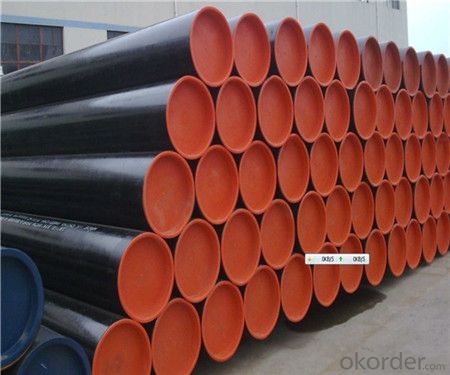
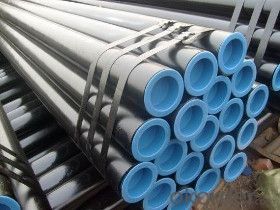
FAQ of Seamless Pipe
①How is the quality of your products?
Our products are manufactured strictly according to national and internaional standard.If products’ quality don’t accord to discription as we give or the promise before you place order, we promise 100% refund.
②How about price?
We are factory and be able to give you lowest price below market one, and we have a policy that “ for saving time and absolutely honest business attitude, we quote as lowest as possible for any customer, and discount can be given according to quantity”.
③Why should you chose us?
Chose happens because of quality, then price, We can give you both.Our service formula: good quality+good price+good service=customer’s trust
SGS test is available, customer inspection before shipping is welcome, third party inspection is no problem.
Any question, pls feel free to contact us !
- Q: When can I use the PVC pipe and when to use the galvanized pipe?
- PVC pipeline use temperature is -5 to 90 degrees or so, according to the current market price of around 6000 yuan per ton, the price is cheap. Its corrosion resistance is good, can resist most of the acid and alkali, and unlike the steel pipe that is easy to rust, so in the construction of the upper and lower water pipes and other fields have gradually replaced the trend of steel pipe.
- Q: What is the cost of steel pipes compared to other pipe materials?
- The cost of steel pipes is typically higher compared to other pipe materials such as PVC or copper.
- Q: How are steel pipes marked for identification and traceability?
- Various methods are utilized to mark and trace steel pipes for identification purposes. One prevalent technique involves the use of permanent markers or paint. These markings typically encompass vital information such as the manufacturer's name or logo, the pipe's dimensions and specifications, and the production date or batch number. Aside from surface marking, steel pipes may also be identified through the utilization of tags or labels. These tags are commonly constructed from durable materials such as metal or plastic and are securely affixed to the pipe. They entail comprehensive details regarding the pipe, including its unique identification number, material composition, and any pertinent certifications or standards it adheres to. Another method employed for identification and traceability encompasses the application of barcodes or QR codes. These codes can be scanned using specialized equipment or mobile applications, instantly granting access to comprehensive information concerning the pipe's origin, production process, and quality control measures. Barcodes and QR codes offer a more efficient and automated means of monitoring and tracing steel pipes throughout their lifespan. Moreover, some steel pipes may feature embossed or engraved markings directly on their surface. These markings are typically etched into the metal and possess the ability to withstand harsh conditions, ensuring long-term visibility and legibility. The ultimate objective of marking steel pipes is to guarantee their accurate identification and traceability throughout their lifespan. This aids in quality control, maintenance, and inspection procedures, as well as ensuring compliance with regulatory requirements. Clear and permanent markings enable manufacturers, suppliers, and users to effortlessly track and trace the history and specifications of steel pipes, facilitating better management and accountability in diverse industries such as construction, oil and gas, and infrastructure development.
- Q: How are steel pipes used in wastewater treatment plants?
- Steel pipes are used in wastewater treatment plants for various purposes such as transporting wastewater, carrying chemicals and additives, and supporting the infrastructure.
- Q: How are steel pipes tested for leaks?
- Steel pipes can be tested for leaks using various methods, including hydrostatic testing, pneumatic testing, and using leak detection equipment such as ultrasonic testing or helium testing.
- Q: Can steel pipes be used in high-pressure applications?
- Yes, steel pipes can be used in high-pressure applications. Steel pipes are known for their strength and durability, making them suitable for handling high-pressure fluids or gases in various industries such as oil and gas, chemical processing, and power generation. They are designed to withstand the stress and pressure exerted on them, ensuring reliable performance and safety in high-pressure environments.
- Q: Can steel pipes be used for firefighting systems?
- Indeed, firefighting systems can utilize steel pipes. Steel pipes are frequently chosen for their robustness and ability to endure high temperatures, making them ideal for transporting water and other fire-suppressing agents. Typically, these pipes are employed in larger commercial or industrial structures that necessitate a larger flow rate and pressure for their fire protection systems. Additionally, steel pipes possess the benefit of withstanding external forces and impacts, thus ensuring the integrity of the firefighting system. Moreover, steel pipes offer the convenience of easy connection, simplifying installation and maintenance procedures. Nonetheless, it is crucial to ensure that the steel pipes employed in firefighting systems undergo appropriate treatment to prevent corrosion and rusting, as these factors may compromise their effectiveness during emergency situations. Regular inspections and maintenance are necessary to guarantee the reliability and functionality of the steel pipes within the firefighting system.
- Q: What is the bending strength of steel pipes?
- The bending strength of steel pipes can vary depending on factors such as the grade and thickness of the steel, as well as the specific manufacturing process. However, in general, steel pipes are known for their high bending strength due to the inherent strength and durability of the material.
- Q: What are the different methods of pipe support for steel pipes?
- There are several methods of pipe support for steel pipes, including clamps, hangers, brackets, and guides. Clamps are used to secure pipes to a structure, while hangers suspend the pipes from overhead supports. Brackets provide lateral support and stability, and guides are used to control pipe movement and prevent excessive sagging. These various methods ensure the proper installation and stability of steel pipes in different applications.
- Q: How are steel pipes protected during transportation?
- Steel pipes are typically protected during transportation through a variety of means such as wrapping them with protective coatings, using plastic or metal caps to cover the ends, and securing them with straps or bands to prevent any movement or damage. Additionally, they may be placed in crates or on pallets and secured with stretch film or shrink wrap for added protection.
Send your message to us
Round Seamless Steel Pipes
- Loading Port:
- Tianjin
- Payment Terms:
- TT or LC
- Min Order Qty:
- 100 m.t.
- Supply Capability:
- 1000 m.t./month
OKorder Service Pledge
OKorder Financial Service
Similar products
Hot products
Hot Searches
Related keywords
